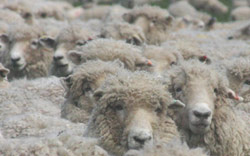Aussies hoping to breed out burpers
 In an effort to breed the burpers out of the Aussie national flock scientists there are attempting to unravel the genetic make-up of the sheep.
In an effort to breed the burpers out of the Aussie national flock scientists there are attempting to unravel the genetic make-up of the sheep.
Julie Gaglia, of the Department of Agriculture, Fisheries and Forestry, said the Reducing Emissions from Livestock Research project was part of the Australian Government’s Climate Change Research Program, aimed at making research outcomes useful and applicable to industry.
“The Australian Government is working with researchers, industry and producers to ensure the science addresses the effects of a changing climate in a way that will help land managers improve their management practices and be profitable and sustainable,” Ms Gaglia said.
“This research and demonstration will continue through the $429 million Carbon Farming Futures Program.”
Associate Professor Phil Vercoe from the University of Western Australia said methane is a by-product of the fermentation in the sheep’s rumen and hind gut.
“Methane production is largely dependent on diet quality and feed intake, but research in cattle shows that animals selected for higher feed efficiency produce less methane per kilogram of dry matter intake than cattle selected for lower efficiency,” Assoc. Professor Vercoe said.
“This suggests that methane production is heritable to some degree and that reducing methane emissions through genetic selection is feasible.”
The University of Western Australia has carried out tests on about 2,500 animals from the Sheep Cooperative Research Centre (CRC) Information Nucleus Flock in New South Wales, Victoria and Western Australia.
“Our tests indicate that a preliminary estimate of heritability using a short–term methane measurement is low but encouraging,” Assoc. Professor Vercoe said.
“But we need to screen more animals to improve the accuracy of this estimate and to enable correlations to other production traits to be estimated.
“Our work and the work that has been undertaken in a parallel program in New Zealand, indicates that heritability is about 0.1-0.2.
”Reducing emissions from sheep production systems will not only assist Australia in achieving its long-term domestic emissions targets, but also improve the profitability of sheep producers.
“It is likely that more feed-efficient animals will produce less methane per unit of wool or meat.
“Economic modelling shows that decreasing feed requirements in terms dry sheep equivalent per head by one per cent would add more than $15 million to the value of the industry each year.”
Category: Environment
